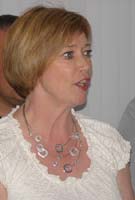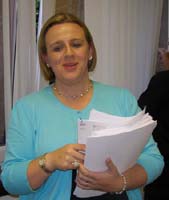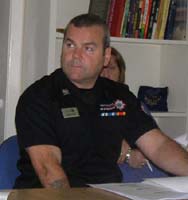More than 30 people from around 20 organisations attended a briefing organised by SCoJeC on recent and forthcoming legislative changes that could have a major impact on the Community. The topics covered were Child Protection, the new Points Based Immigration System, Fire Safety, and Charity Regulation. The meeting was chaired by the Chair of SCoJeC, Dr Walter Sneader.
 |
The first speaker was Ann O'Neill from the Central Registered Body in Scotland (CRBS), which operates the "Disclosure" system on behalf of voluntary organisations. She explained that the system for obtaining the criminal record checks that are required for anyone working with children, young people, or vulnerable adults is being completely revamped. The present system is no more than a snapshot at the time a check is requested, and offers no assurance that an employee does not obtain a relevant conviction the following day. However, the new system, which will start in 2010, will fill this loophole, as the records of "scheme members" will be continuously updated; employers, however, will not be notified of changes unless the individual is subsequently barred from working with children or "protected adults", but will be able to obtain updated disclosures more easily and quickly. People who already have disclosures under the old system will have to join the new system, but this will be phased in over a period of four years. The system under which SCoJeC operates as an umbrella for the entire Jewish Community, so that one Disclosure allows a volunteer to work for many communal organisations worked well and would continue.
 |
Lynn Macintosh from the UK Border Agency described how border control has been tightened so that someone coming from outwith the European Economic Area to participate in an event in Scotland - even as a volunteer and even for only a few hours - must be sponsored by an organisation registered with the UK Border Agency, and then also apply for their visa under the new "points-based system". SCoJeC is registered to sponsor visitors coming to work in the Jewish Community, and although individual organisations were at liberty to register themselves this is costly and complex. Issuing a sponsorship number is done on-line once the relevant information has been supplied, but the visitor must then apply for a visa at a British consulate, giving that number together with biometric data and the appropriate fee, and that part of the process could take more than a month. The speaker stressed that the arrangement with SCoJeC was greatly to the advantage of the community in that the UKBA would accept its assurances in place of evidence that visitors are able to support themselves in the UK, but that that status would be withdrawn if it was found to be abused. SCoJeC therefore has an obligation to report any visitors who breached the terms of their visa, for example, undertaking work other than that for which they were admitted, or not staying at the address they had given. Failure to report such breaches could attract criminal penalties, and would be greatly to the disadvantage of the community.
 |
Group Commander Jim Scott of the Strathclyde Fire and Rescue Service explained the new fire safety regime which had been introduced in 2008. The emphasis had moved from the Fire Service issuing instruction to an obligation on those responsible for premises carrying out their own risk assessments, which should include consideration of alarms, emergency exits, lighting, etc. This could apply to both owners and to organisations leasing premises for meetings, and required a written record to be kept. The Fire Service would periodically audit all premises, and could issue a variety of enforcement notices, but they regarded this as a last resort. However, organisations should be aware that failure to comply with advice could affect their insurance.
Finally, Leah Granat, Public Affairs Officer of SCoJeC, briefly summarised some of the requirements of the Scottish Charity Regulator (OSCR) that affected communal charities. A number of charities had failed to respond to communications from OSCR and had only been saved from delisting after SCoJeC had alerted them to the situation.
Charities are required to show all the names by which they are known, and their charity number on a wide range of documents, including e-mails, adverts, complements slips, etc. UK charities that operate in Scotland are required to register with OSCR and to submit an annual return (though this need not give separate financial accounts for Scottish activities), and, unlike the situation in England there are no exemptions for small charities. Finally, legislation is currently before Parliament which would enable charities to pay for Trustee Liability Insurance.
Thanking the speakers, SCoJeC Director Ephraim Borowski said that it is important for all communal organisations to comply with these regulations, and that the consequences of failing to do so could be serious, not just for the organisation concerned, but for the good name of the Jewish Community as a whole. SCoJeC's good connections with all the relevant regulatory bodies enable it to assist communal organisations effectively is in these matters, and we are very happy to help.